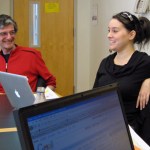Technology
A Reuters piece under the headline, "Biotechnology Boom Raises Security Fears: Mild Diseases Could Be Turned Into Deadly Ones, Experts Caution" we see the biotech Frankenstein/terrorist bogeyman raised once again by "experts" in the area at a scientific conference in Casablanca. The weekend conference was run by a tiny group (budget of less than $250K) with a big name, the International Council for the Life Sciences (ICLS). Their sole mission is biological biosecurity, so it is understandable that their conclusion is that this is a big problem. But is it?
On the surface the proposition is…
There are two interdisciplinary science meetings coming up that you should consider attending, in NYC and DC. Strangely enough, the ubiquitous Chris Mooney is speaking at both of them. Hmmm.
From April 30-May 1 in DC will be the AAAS Forum on Science and Technology Policy, which is a somewhat wonky look at federal science policy and government affairs. The agenda highlight? A plenary session on the future of science journalism, to which I'm looking forward with both enthusiasm and curiosity, given the wide range of opinions on the blogosphere. I'm sure there will also be lots of discussion…
Over at his new digs, Chris Mooney talks about efforts to re-launch the OTA:
I’m starting to detect some buzz on this very important front, which I wrote about in detail in 2005’s The Republican War on Science and elsewhere. Basically, the story is this: In 1995 the Gingrich Republicans, looking to slash budgets–and looking askance at science in general in many areas–got rid of their scientific advisory office, which had been in existence since 1972 and had become world renowned not only for accurate studies, but for far-ranging analyses that forecast future science and technology problems…
So, let's see what's new in PLoS Genetics, PLoS Computational Biology, PLoS Pathogens and PLoS ONE this week. As always, you should rate the articles, post notes and comments and send trackbacks when you blog about the papers. Here are my own picks for the week - you go and look for your own favourites:
Harmonics of Circadian Gene Transcription in Mammals:
Circadian rhythms confer adaptive advantages by allowing organisms to anticipate daily changes in their environment. Over the last few years, many groups have used microarray technology to systematically identify genes under circadian…
"I'm not an expert on any of these things. Much of what I say should be taken with a grain of salt."
So said Freeman Dyson, Professor Emeritus at Princeton's Institute for Advanced Physics, all-round brilliant scientist, and self-professed global warming "heretic," during a round of questions and answers following his talk Tuesday night at Furman University in Greenville, S.C. "I am not speaking to you as a scientist, but as a story-teller ... of science fiction."
So why then, I asked, should we pay attention to what you have to say on climate change, considering that those who are experts in…
Ok ok.. how about 'Using science to kill the fewest people while seeking world domination'... hmm... maybe not that either, how about 'Using science to protect our way of life'
There we go!
Now that you know what we're talking about you can check out a podcast that I'm particularly interested in called Armed With Science.
Here's the schtick:
Research and Applications for the Modern Military, is a weekly webcast that discusses various applications of science and technology to military operations, and the cutting-edge scientific research and development sponsored by various defense offices. We…
In discussions lamenting modern day political interference in science and the less-than-prominent role science plays in formulating policy, bringing back the Congressional Office of Technology Assessment (OTA) is commonly offered as a key facet of any comprehensive solution. And, this is for good reason, as Gerald L. Epstein explains in a new article at Science Progress:
Over its history, OTA informed members of Congress and their staffs and helped shape legislation. But its reports played a far wider role. Since they explained complicated technical concepts to a non-technical audience, they…
When pundits like Richard Dawkins use the trust and authority granted them as scientists to denigrate religious publics, is it unethical?
On issues such as climate change, nanotechnology, and evolution, research in the area of framing is being used to design and plan communication initiatives and to craft novel, accessible, and relevant narratives for nontraditional audiences across media formats. The intended outcomes include increased learning, dialogue, and public participation.
Yet what's still missing is a clear outline of the ethical and normative imperatives that apply to scientists,…
I don't usually publish press releases, but I'm making an exception for this one, since your's truly is one of the Co-PI's. If you're a teacher within commuting distance of Seattle, the schedule and sign up information is here.
NSF AWARDS $1.3 MILLION TO NWABR FOR BIOINFORMATICS EDUCATION
Innovative Technology Experiences for Students and Teachers (ITEST) brings the understanding of how biology and information technology interact to teachers and their students
Seattle, WA - March 26, 2009 - The Northwest Association for Biomedical Research (NWABR) has been awarded a $1.3 million dollar…
Missiles are a problem if you're fighting a modern war. You can get out of the way or you can hide behind something, but that's about it. Now anti-missile technology has had some success dealing with mid-range missiles. The Patriot system whose success was limited during the Gulf War has since been improved into a system that's quite effective in dealing with the large and somewhat lumbering tactical ballistic missiles fielded by a number of adversaries.
But smaller missiles and mortars remain an intractable menace. It takes mere seconds for something like a Qassam rocket to travel its…
I had the happy pleasure of visiting on Friday with Sheril Kirshenbaum and Bora Zivkovic for a panel discussion in a course at Duke University's Institute for Genome Sciences and Policy.
="" p="">
Directed by Dr Misha Angrist, PubPol 196S "Science in the Media" is described in the course catalog as follows:
Those who write about science, health and related policy matters for a general audience face a formidable challenge: to make complex, nuanced ideas understandable to the nonscientist in a limited amount of space and in ways that are engaging and entertaining, even if the topic is far…
NSF ADVANCE Workshop For Women Transitioning to Academic Careers
The University of Washington's ADVANCE Center for Institutional Change received an award from the National Science Foundation ADVANCE program to hold professional development workshops for Ph.D.-level women in industry, research labs, consulting, or national labs who are interested in transitioning to academic careers in STEM. The first workshop will be held October 18- 20, 2009.
This workshop will be very helpful to women interested in making the transition to academia. The workshop speakers will primarily be successful…
"Digital biology," as I use the phrase, refers to the idea of using digital information for doing biology. This digital information comes from multiple sources such as DNA sequences, protein sequences, DNA hybridization, molecular structures, analytical chemistry, biomarkers, images, GIS, and more. We obtain this information either from experiments or from a wide variety of databases and we work with this information using several kinds of bioinformatics tools.
The reason I'm calling this field "digital biology" and not "bioinformatics" (even though I typically use the terms as…
Bloggers are reacting to the news of major scientific fraud: Massachusetts anesthesiologist Dr. Scott Reuben falsified data in his published studies for more than a decade.
Janet Stemwedel at Adventures in Ethics and Science explores the effects of Dr. Reubenâs duplicity on anesthesiology and surgical patients.
Orac at Respectful Insolence considers how Dr. Reuben was able to get away with fraud for so long.
Merrill Goozner at GoozNews notes that Dr. Reubenâs drug trials, like many industry-funded studies, didnât examine the question that would really be of interest to physicians.
Alison…
Yesterday, Seed Media Group was proud to launch a new and improved SEEDMAGAZINE.COM. The site is loaded with rich content, advanced navigational tools and display features where design and functionality are flawlessly combined to guide you through all the glorious science you could want.
From the editors of SEEDMAGAZINE.COM:
Science is changing our world. It is behind the transformations--social, economic, artistic, intellectual, and political--that are defining the 21st century. Through this lens, and with the newest tools of media and journalism, we aim to tell the fundamental story of our…
From an e-mail from SPARC and The Alliance for Taxpayer Access yesterday:
FIRST U.S. PUBLIC ACCESS POLICY MADE PERMANENT
2009 Consolidated Appropriations Act ensures NIH public access policy will persist
Washington, D.C. - March 12, 2009 - President Obama yesterday signed into law the 2009 Consolidated Appropriations Act, which includes a provision making the National Institutes' of Health (NIH) Public Access Policy permanent. The NIH Revised Policy on Enhancing Public Access requires eligible NIH-funded researchers to deposit electronic copies of their peer-reviewed manuscripts into the…
Science on the Campaign Trail:
In November 2007, a group of six citizens decided to do something to elevate science and technology in the national dialogue. They created Science Debate 2008, an initiative calling for a presidential debate on science policy. They put up a Web site, and began encouraging friends and colleagues to sign a petition calling for the debate. Within weeks 38,000 scientists, engineers, and other concerned citizens had signed on. The American Association for the Advancement of Science (AAAS), the National Academies, and the Council on Competitiveness (CoC) joined as…
The FBI "raided" the Washington DC (city) office of Vivek Kundra, who is just finishing his term as Chief of Technology for the district. Kundra had been asked to to to the Federal Government to be the federal chief information officer.
Later in the day, the FBI agents arrested two people, a DC worker, Yusef Acar, and an employee of Advanced Integrated Technologies Corp, Sushil Bansal.
Reasons for the raid and the arrest are not currently known but should be soon because the two arrested men will be in court momentarily.
source: Faux News.
A really great Issues in Science and Technology article by Sheril and our ScienceDebate2008 colleague (and CEO) Shawn Otto is now available online here. It is a look back at the unprecedented ScienceDebate initiative and the not inconsiderable impact it had on the campaign--despite numerous hurdles, including an uninterested media and candidates who were not exactly jumping to debate science policy. An excerpt:
Although the candidates still refused to debate, instead attending yet another faith forum at Saddleback Church in California, Science Debate 2008 was able to obtain written answers…
Guest post from Female Seaside Scientist, for the Diversity in Science Carnival!
Dr. Cindy Lee Van Dover is a Professor of Marine Biology, Director of the Duke University Marine Lab, and Chair of the Marine Science and Conservation Division at the Nicholas School. Her research combines biogeochemistry, biodiversity, ecology of chemosynthetic deep-sea vent organisms, marine technology, and astrobiology.
Faculty page here; research page here; cv here.
More after the jump
Professor Van Dover had an early fascination with Jules Verne's Captain Nemo character from the "20,000 Leagues under…



